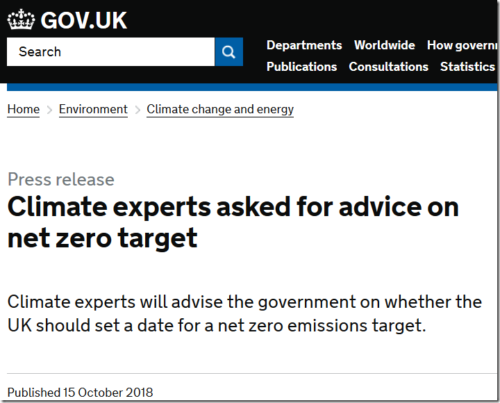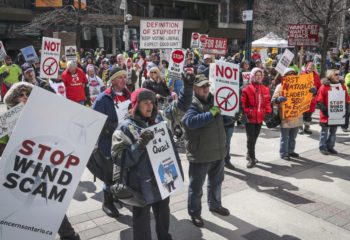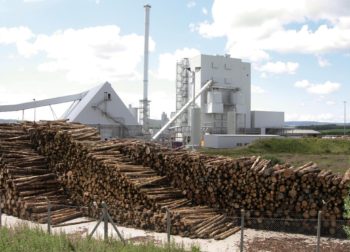Just when you think that the Government cannot get any more stupid, they go and prove you wrong!
To mark the launch of this nationwide week, Energy and Clean Growth Minister Claire Perry today (Monday 15 October) wrote to the Committee on Climate Change (CCC) asking for advice on:
- setting a date for achieving net zero greenhouse gas emissions from across the economy, including from transport, industry and agriculture
- whether we need to review our 2050 target of cutting emissions by at least 80% relative to 1990 levels to meet international climate targets set out in Paris Agreement
- how emissions reductions might be achieved in industry, homes, transport and agriculture
- and the expected costs and benefits in comparison to current targets
This makes the UK one of the first in the G7 to formally explore setting an even more ambitious target than its current one. It follows a report from the Intergovernmental Panel on Climate Change (IPCC), showing more rapid action is needed to reduce greenhouse gas emissions to avoid devastating risks of climate change to health and global prosperity.
The UK is already a world leader when it comes to tackling climate change. We led the world with our Climate Change Act, and since 1990 we have led the G7 in cutting emissions while growing our economy on a per person basis. In 2017 we saw renewable energy generation at record levels, and we are among the world’s best in cutting our carbon intensity.
But the government is determined to do more and our first-ever Green GB & NI Week will celebrate the progress we have made while challenging governments, businesses and civil society to rise to the task.
During Green GB Week, Claire Perry will also highlight the economic opportunities of moving to an even greener, cleaner economy. There are already almost 400,000 jobs in the low carbon economy and this could quadruple to around 2 million, generating up to £170 billion of annual exports. This is why the government has put Clean Growth at the centre of its modern Industrial Strategy.
https://www.gov.uk/government/news/climate-experts-asked-for-advice-on-net-zero-target
The stark truth is that neither the government or the Committee on Climate Change has the faintest idea how we are going to achieve the current target of an 80% cut in emissions by 2050, never mind eliminating emissions entirely.
It is true that CO2 emissions have fallen from 596 MtCO2 in 1990 to 356 MtCO2 in 2016, a cut of 40%. However, nearly half of this fall, 118 MtCO2 occurred between 1990 and 2009, and therefore had little to do with the 2008 Climate Change Act or climate policies generally.
Between 1990 and 2009, emissions from industry fell by 45 MtCO2, largely because of the shrinking of our industrial base. Since 2009, industrial emissions have fallen by a further 16 MtCO2. So, of the 40% cut since 1990, 10% is the result of industrial decline.
Nearly all of the rest of drop in emissions has been in the power sector. Between 1990 and 2009, they fell by 82 MtCO2. This was almost entirely due to the switch from coal to gas. According to DUKES, coal usage at power stations fell from 49.84 to 24.66 Mtoe, between 1990 and 2009. Gas usage increased from 0.56 to 30.9 Mtoe. Other changes in the power mix were insignificant.
Since 2009, coal usage has declined to 5.55 Mtoe, while gas usage in the power sector has also fallen by 6 Mtoe. This is partly due to reduced generation and partly due to replacement by renewables. However, it is also worth noting that net imports have increased by 12 TWh, equivalent to 4% of electricity supplied.
We must also remember that the official emission figures are understated because biomass is treated as emission free. In reality, as many experts are now pointing out, CO2 emissions from biomass are real and just as high as coal power. According to DUKES, biomass used for power equated to 10.96 Mtoe last year, effectively canceling out half of the emission savings from reduced coal power.
There’s a lot of numbers here, but in short of the cut of 240 MtCO2 since 1990, probably only about 50 MtCO2 has been the result of decarbonization policies. And this has come at a mammoth cost of £11.3bn this year alone.
Yet the government now wants us to cut emissions from 356 MtCO2 to zero. Even if possible, how much would all of this cost?
Even if the power sector could be made emissions-free, there still remains the rest of the economy, where emissions have changed little since 2009.
https://www.gov.uk/government/publications/updated-energy-and-emissions-projections-2017
Meanwhile, the grid is currently relying on fossil fuels for nearly 60% of its power:
https://www.solar.sheffield.ac.uk/pvlive/#
Claire Perry says we are the world leader in tackling climate change, but the rest of the world is paying precious little attention.
Fatih Birol, head of the IEA, told us just this week that he was in “despair” about the latest numbers he is getting for global emissions, which are on track to rise again this year:
In stark contrast to Claire Perry’s La La Land!
Read more at Not A Lot Of People Know That




















Dangerous thinking by the idiots running the UK Government Energy Department. It was pretty clear the UK’s Energy policy is being driven by the Green NGO’s. However, I’m not sure if this at the moment is just grand standing by the UK Government to try and look good at the forthcoming hypocritical climate activists bean feast. You know the one where all these hypocritical ass**** add to their CO2 footprint by flying to this years venue, to talk about a total non event.
Having said all that we do in the UK have a number of very stupid MP’s who believe in the climate change scam, including our very poor performing Prime Minister. And now they are trying to tell us the ICE’s have to be banned by 2030 or so. That demonstrates the level of pragmatism with have in our Government. It does make me wonder if the UK is really fit to govern itself after Brexit, if we ever get there. On the other hand anything is better than being governed by the EUSSR.